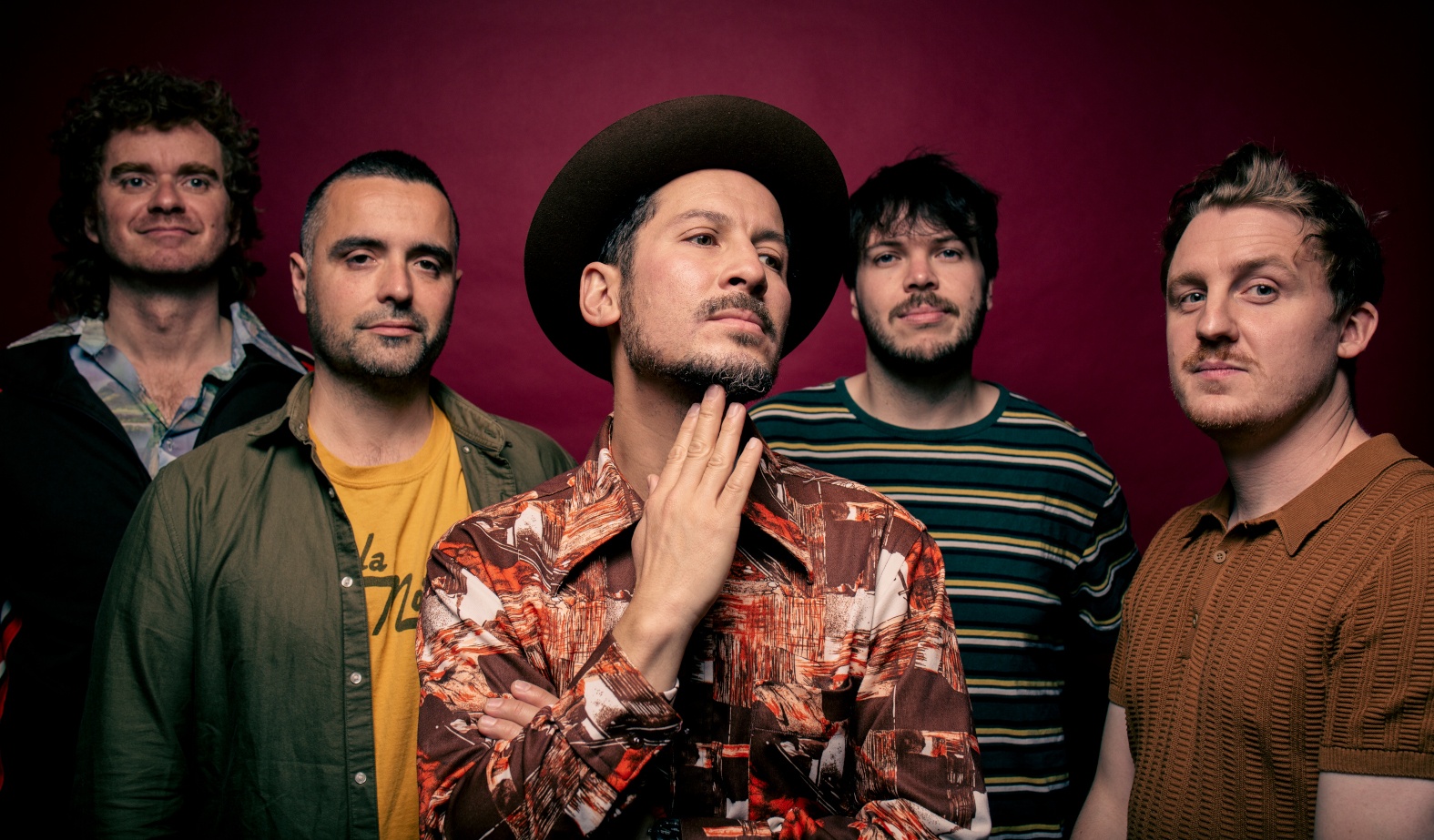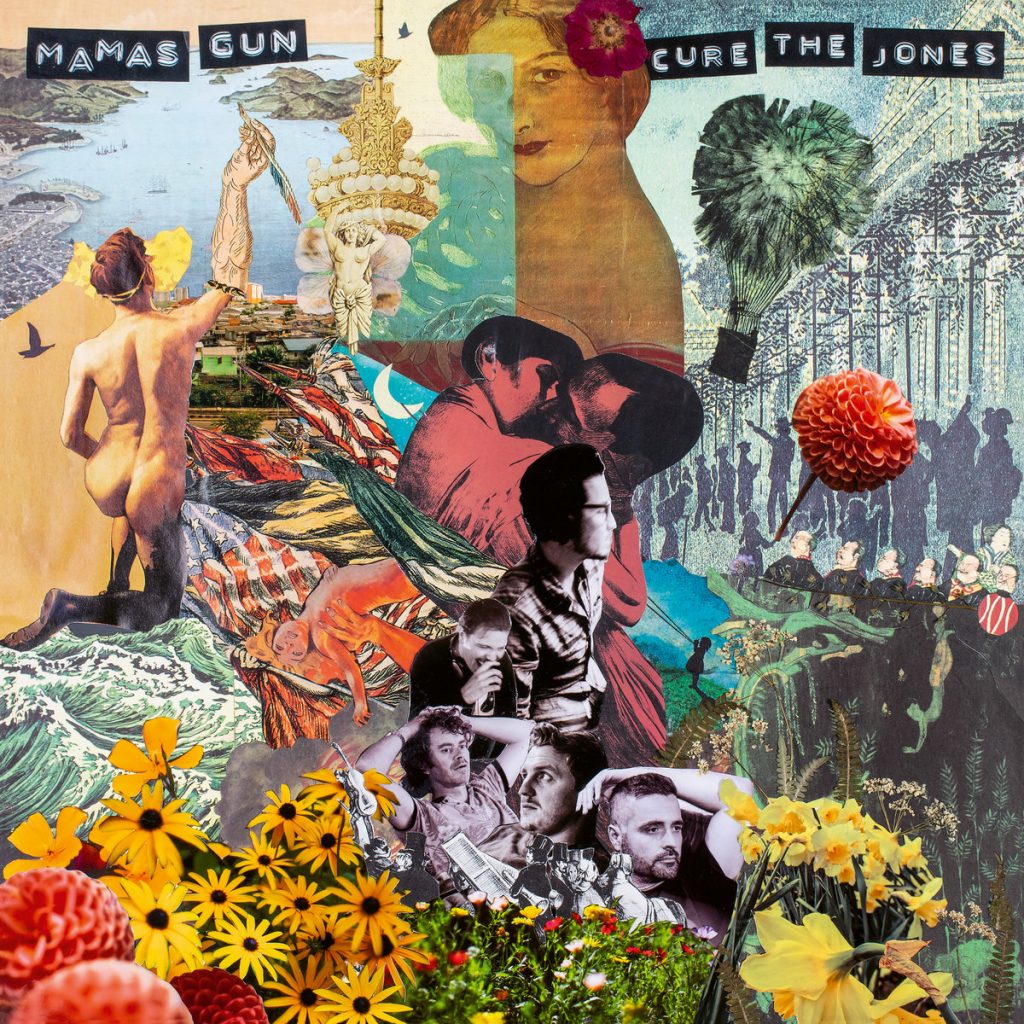Andy, we just caught you on the first Mamas Gun tour since Pandemic, taking you through the UK, the Netherlands and Germany. How does it feel to be back on stage and performing in front of a live audience? Hand on heart: Did you have a bit of stage fright at your first gig?
Honestly those first few shows after being away for so long were genuinely emotional – for us and the audiences. To see people actually crying during the shows and afterwards hearing the words “thank you so much we really needed that tonight” from almost everyone we spoke to, just underscored the power of live music to reach people in a way that nothing else can.
I have to admit, no matter how many shows I do, whether it’s front of 500 people or 5,000 people, I always get very nervous just before going on. But every performance has a unique energy and it’s our job as a band and mine as a front man, to tap into that, to turn it into a communal thing of everyone being in it together, living in the moment and nothing else.
Not only are you finally on tour again, but you also have a new album out after almost four years with “Cure The Jones”. On the new album you refine the rich soul sound that you pursued on the predecessor “Golden Days“. Everything sounds a bit more elegant and sophisticated. How would you describe your musical development since your last album?
It’s always tough having to self-analyse. I don’t know that I particularly enjoy doing it. But to try and answer your question… everything is deeper on this record – musically, lyrically and the production aesthetic. It’s the sound of a writer and a band trying to tunnel deeper and mine previously undiscovered seams. Personally, the older I become, the more importance I place on lyric writing. It’s the hardest thing to do well and get right. I’m in a constant state of flux and dissatisfaction though. My confidence in my abilities and my self-esteem is inextricably tethered to how I perceive the quality of my ongoing songwriting output. Sometimes I think that I’m okay and can actually write a half decent tune. Other times I just feel like a total charlatan who should have given up a long time ago.
You wrote the album during the Covid pandemic. The last time we spoke was at the beginning of the crises when we were all at a loss. How much did the development of the last years influence the songs on the album?
Cure The Jones wasn’t just another album in the cycle of record-tour-record-tour. The pandemic applied a unique set of influences which meant that many of the songs reflected the state of the world on a number of different levels, whether they were obvious or more disguised. A lot of creative solitude impacted the creation of music in a way that is different to creation during ‘peace time’ as it were. It’s all there though – from the life-before and life-after moment in ‘When You Stole the Sun From The Sky’ to endurance and tenacity in ‘Go Through It’ to hope and redemption via ‘Daffodils’. There are side-steps into more personal things but the whole thing is framed by what has happened in these past years.
Does soul music offer the right vocabulary to deal with such a crisis situations?
I think the numerous musical precedents show that it does, whether we’re talking about the key works of Nina Simone, Curtis Mayfield, Gil Scot Heron or Marvin Gaye etc. There is a wide and rich vocabulary available in soul music to imbue topics and compositions with seriousness or hope in equal measure. Ultimately I always get a sense of redemption and salvation through the uplifting language of soul music.
Was the writing also a kind of therapy for you in the face of these uncertain times?
Of course! It’s how I’ve avoided talking to a shrink my whole life haha! Writing songs is the best kind of therapy and outlet for all kinds of emotional turbulence, and not necessarily in the subject matter but more so through the act and the process.
How close was the contact with the other band members during the pandemic?
We were lucky to be able to make music in real time together online thanks to a new technology that our tour sound engineer Doug Hunt created, evident in the live stream concerts we put on with each of us performing separately from our homes. But in terms of actual in-person meetings?…..Well 80% of this album was made in just 3 days. The 3 days we managed to steal when restrictions and infections numbers were at their lowest ebbs.
Let’s talk about some of the new songs. Two years ago, the great singer and songwriter Bill Withers died. “Looking For Moses” is a bow to Withers and in a way the starting point for “Cure The Jones”. What did his death trigger in you?
It was written on the day he died. The man was a master craftsman and knew how to extract the most meaning and impact out of something so deceptively simple. Straight talking lyrics laced with shards of poetry, his songs were strong and characterful, and muscular both musically and lyrically. Looking For Moses was my attempt to pay tribute to the great man but also a vehicle for me to exorcise my own feelings about this horrible place in which we all found ourselves….looking for someone or something, a saviour, a vaccine….to lead us out of the mire to safety.
One of my highlights is “Party For One”, a song that reminds me a bit of the symphonic soul of Isaac Hayes. You said that the beginning of the pandemic inspired you to write this song. Tell us about it.
I like my own company. To think, to create, to just be and ruminate. However, when the pandemic handed me all the time and solitude that on a plate, I found myself mourning the ‘anonymous togetherness’ of being with others. Attending live events or eating dinner at a restaurant or even shopping at a supermarket. Y’know, everyone in their own private worlds, but together. SO much of that is the stuff of life.
You filmed a great video for the “Party For One”. Did you have fun turning into werewolves? Where did you get the idea?
It was Cam’s (bass player Cameron Dawson) idea. It was based on our travels around the world where after shows we’ll hit a bar or a club…this is where our keys player (Dave Oliver) steps up and gets us and all the people around us basically doing organised line-dancing. After many drinks it’s a lot of fun, in a kind of you-have-to-be-there type way….
The video shows a side of you that is also an important aspect of your popularity. As serious as you are about making music, a touch of tongue-in-cheek irony and wit should never be missing. How important is humour to you in your work?
I think all of us in the band hold onto our humility fiercely. There’s no place or time for arrogance or posturing. We’re a very close, very tight knit family and this fun-loving side is a huge part of who we are.
Are there songs on the album that are particularly close to your heart?
“When You Stole The Sun From The Sky” was one of those 30 minute lighting bolts that seemed to be this perfect pairing of melody and lyric – especially in the chorus. It also secretly scratches my itch to want to be Scott Walker in another life. He’s probably my favourite vocalist. Anyway, I was in the middle of writing another song for the album when this one landed in my lap. I had to stop and bottle the lightning before returning to the song I had initially started. You have to be ready for when the muse strikes.
On “Golden Days” you did the whole production for the first time. “Cure The Jones” was produced entirely in your own studio. How does it feel to hold the creative process from the first song idea to the final product in your own hands? Do you also associate this with a gain in creative freedom?
It’s very empowering knowing what you want and what you don’t want and knowing that the buck starts and stops with you. It’s partly to do with age and experience, but also confidence. When these things align in a positive way, it feels like you can take great strides compared to where you’ve been previously. Ironically this freedom has meant that we have been able to focus the sound and narrow our field of view in terms of what we are presenting as Mamas Gun and how we wish to be perceived. It must be said that Mamas Gun 2.0 started with Golden Days and that was a lot to do with Chris Boot (drummer) suggesting that we take things in our own hands and push it towards more of a deeper soul route.
Are there any producers you consider role models?
Not really no. It’s artists that occupy that space for me. On a personal level, back in the day, Paul Staveley O’Duffy was the closest I ever came to having some kind of producer mentor I guess.
You recorded „Cure The Jones“ with an array of analogue gear. Do analogue instruments and recording techniques stand for more authenticity in music for you? Is that an important factor, especially in soul music?
When it comes to gear, the question must be asked “how it can best serve the music?” There’s something in the vernacular of soul music and in the way that we record as a band that means tape is an appropriate medium, and one which helps to bring out the best in our performances. When you know that (expensive) tape is running then you make sure you bring your A-game. That said, we don’t shy away from using the computer when it makes sense. We live in a crossover age of having access to the best of the digital and analogue eras.
You recorded the album in only three days – that’s not much time. Is that a sign that despite the pandemic, Mamas Gun has become a sworn, well-rehearsed band over the years?
I think because of the limitations of the pandemic our collective senses and focus where sharpened to ensure that any recording opportunity bore the most amount of fruit. The songs had already been written, we had an idea of the process and sound for each…all that was left to do was execute and capture.
How do you interact as a band in the studio when recording? Do we have to think of the process as democratic? Or are you already the driving and controlling force?
I don’t think I ever ‘control’ anything per se, that’s a strong word. The songwriting dictates where things are naturally steered anyway. But I only ever want to achieve the best version of an idea so if anyone can offer anything to improve a song/recording then of course I’m always open to that. Since I am the one who generally engineers when we record together then there is a certain amount of responsibility on my shoulder to keep the sessions productive in the right way, but creatively, it’s a safe zone and we work democratically to achieve the best result.
Songwriting has always been an important part of your career. How would you describe your development as a songwriter since the first Mamas Gun album?
I’ve always just tried to stick to what it is that I do. When I was younger, perhaps I wanted to be all things to all men, to try many hats but at the core I think I’ve maintained an identity in my writing. I’ve also embraced my voice more, and used it to help determine the kinds of songs I’ll write, sending me to places which end up being more unique to me. Or something like that…
I know that you don’t see yourself primarily as a singer. But the quality of your singing is more than convincing. How would you see your development as a singer in the last few years?
I consider myself a musician first and foremost. I have learned that I have the kind of voice that suits a soulful backdrop, and within that context I work hard at trying to be the best I can. I have a certain amount of innate vocal talent but I def put the work in. That said I have become more at ease with seeing myself as a singer and try to embrace what my voice wants to do.
Andy, what’s next for you and Mamas Gun this year?
The release in April followed by lots of touring and our first shows in the US around September / October time. We want to reach more people with this record, which I believe is our best yet, and keep the torch burning for soul music.
A last question: What is your daughter’s favourite song on the album?
I don’t know, I’ll have to ask her. She’ll still probably say “Baby Girl” by Young Gun Silver Fox, haha…
Thank you very much for the interview!
Always a pleasure!


